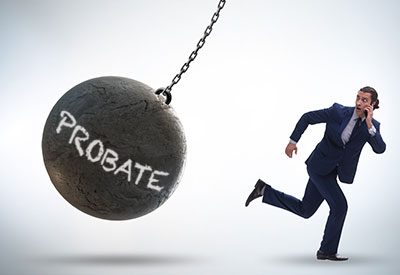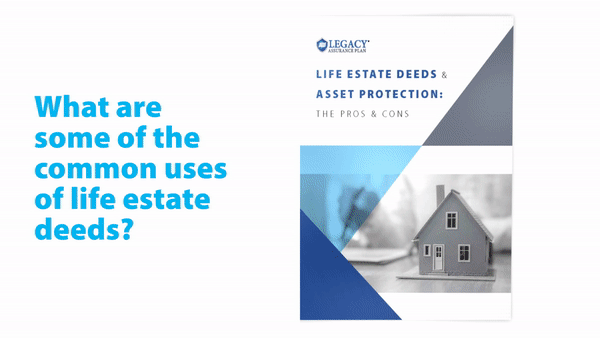Sarah, age 72, stands in the doorway of her family's Victorian home. After 40 years of ownership, she faces a critical decision: how to ensure she can live out her days in this cherished property while guaranteeing its smooth transition to her children after her passing. A life estate deed has been suggested as one potential solution — but Sarah worries about losing control of the property that has sheltered three generations of her family.
Sarah's situation reflects a challenge faced by many aging homeowners across America: balancing the desire to protect their property's future while maintaining necessary control during their lifetime. As property values rise and family dynamics grow increasingly complex, understanding the intricacies of life estate deeds has become essential for anyone engaged in estate planning. This sophisticated legal tool, which creates a unique partnership between present and future property interests, can be part of an effective estate plan or become a source of lasting complications, depending on how well it aligns with your specific circumstances and goals.
Tax laws, Medicaid regulations and property transfer requirements can make the decision even more difficult. A life estate deed might seem like an elegant solution — offering both asset protection and simplified inheritance — but its implications reach beyond simple property transfer. Some homeowners discover too late that they've inadvertently restricted their ability to respond to changing financial needs or family circumstances.


What is a life estate deed and how does it work?
A life estate deed creates a unique legal arrangement where property ownership is split into two distinct interests: the life tenant's right to use the property during their lifetime, and the remainderman's future interest in the property. The life tenant maintains the right to live in and use the property until their death, at which point the property automatically transfers to the remainderman without going through probate.
The life tenant maintains substantial rights and responsibilities during their lifetime. They can live in the property, collect rents if it's a rental property and make reasonable modifications to suit their needs. However, these rights come with obligations. The life tenant, for example, must avoid any action that that substantially diminishes the property's value for the future owner. This includes paying property taxes, maintaining adequate insurance coverage and keeping current with any mortgage payments.
The remainderman's interest, while future-oriented, exists immediately upon the creation of the life estate deed. This interest can be bought, sold or transferred, though its practical value is limited by its contingent nature. Think of it as holding a ticket to a future performance — valuable, but not immediately useable.
What are the primary benefits and drawbacks of life estate deeds?

The advantages of life estate deeds extend beyond simple probate avoidance. They can offer certain Medicaid planning benefits and provide a layer of protection against creditors. However, these benefits come with notable restrictions and potential complications.
Key advantages include:
- Immediate probate avoidance upon the life tenant's death.
- Potential capital gains tax benefits for the remainderman.
- Protection against certain creditor claims.
- Possible eligibility for Medicaid planning purposes.
Significant limitations warrant careful consideration. The life tenant loses the ability to sell, mortgage or refinance the property without the remainderman's consent. This restriction can create practical challenges if the life tenant needs to relocate, downsize or access their home equity for medical or living expenses. Additionally, the arrangement cannot be easily modified or revoked if family circumstances change.
How do revocable living trusts compare to life estate deeds?

Revocable living trusts have become a cornerstone in comprehensive estate planning, offering a level of flexibility and protection that simpler instruments often cannot match. Consider a common scenario: A couple owns multiple properties, including their primary residence, a vacation home in another state and a small rental property that generates retirement income. Initially, they might establish separate life estate deeds for each property, thinking this would simplify inheritance for their children. However, managing multiple life estate deeds often creates unexpected complications and restrictions.
Transitioning to a revocable living trust instead provides several crucial advantages for families with multiple properties. First, they can maintain complete control over all properties through a single, comprehensive document. This consolidation simplifies property management and reduces the likelihood of conflicting arrangements or oversight. For instance, if the family needs to refinance one property to fund improvements on another, they retain the flexibility to do so without seeking permission from remainder beneficiaries — a restriction they would face with life estate deeds.
The trust structure allows property owners to establish nuanced conditions for property distribution that adapt to changing family circumstances. They might specify that the vacation property be held in trust for shared family use, while the rental property's income supports their grandchildren's education. If one child shows interest in managing the rental property while another prefers liquid assets, the trust can accommodate these different preferences while maintaining fairness in overall distribution.
Perhaps most importantly, a revocable living trust provides seamless property management if the property owners become incapacitated — a critical feature absent from life estate deeds. The designated successor trustee can step in to manage all properties, pay expenses, collect rents and make necessary decisions without court intervention or the need for conservatorship proceedings.
The trust structure also offers sophisticated opportunities that surpass the capabilities of life estate deeds. Through careful drafting, trusts can help minimize estate taxes, preserve step-up basis benefits and create flexible distribution options that adapt to changing tax laws.
What other deed strategies can property owners consider?

Estate planning offers deed alternatives to traditional life estate that vary depending on state laws. These options may include:
- Transfer-on-death deeds. Available in many states, these instruments allow property to pass directly to designated beneficiaries while maintaining the owner's complete control during their lifetime. They represent a more flexible alternative to traditional life estate deeds, as they can be modified or revoked without beneficiary consent.
- Enhanced life estate deeds (Lady Bird deeds). These specialized instruments combine the probate-avoidance benefits of traditional life estate deeds with greater flexibility for the life tenant. The enhanced life estate deed allows the grantor to retain the power to sell, mortgage or otherwise encumber the property without obtaining permission from the remainderman.
Which estate planning strategy best protects your property and heirs?

Selecting the optimal estate planning strategy requires careful consideration of personal circumstances, state laws and long-term objectives. Comprehensive estate plans might incorporate multiple tools including trusts, wills, powers of attorney, beneficiary designations, advance directives and various deed instruments.
When evaluating options, consider these factors:
- Your current and anticipated future needs for property control.
- Family dynamics and potential conflicts.
- Tax implications for yourself and your heirs.
- Long-term care planning requirements.
- State-specific legal requirements and available instruments.
- Property location and type.
- Creditor protection needs.
Conclusion
The choice between life estate deeds, revocable living trusts and other property transfer strategies ultimately depends on your unique circumstances and goals. While life estate deeds offer simplicity and immediate probate avoidance, their restrictions can make them less suitable for those who value flexibility and control. A comprehensive estate planning approach typically provides the most robust protection for both property owners and their heirs.
As you evaluate your options, consider consulting with an experienced estate planning attorney who can assess your specific situation, including property holdings, family dynamics, and long-term care needs. Regular reviews of your estate plan ensure it continues to serve your evolving needs and takes advantage of changes in state laws and estate planning tools.



